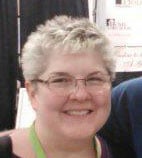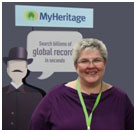There are now several thousand genealogy groups on Facebook. Some are for commercial enterprises and some are for researching in a specific locale or for a specific topic or surname. They are all community forums in which we can participate and help one another with our research. Social networking on Facebook is a great way to meet others, to teach others, and to help others. In order to make it a productive and helpful tool for our research, there are several things we should all put into regular practice.
Today's Topic: Threads
A thread in an online forum refers to one conversation: the initial question or post followed by all the replies, comments, and answers to that post. On Facebook after a certain number of replies, the thread will "collapse" which means it will show up as a shortened version with only the most recent comments displayed. At the top under the original post it will state "View previous comments" and show the number of current comments on the thread, such as "11 of 112." This means that it is showing the most recent 11 comments out of a total of 112.
When participating in a conversation, be sure you first read the entire thread. Doing so means you will know what others have already said and how other answers were shared. Quite often people do not read an entire thread, but they go ahead and reply, answer a question, or ask another question in their comments. This almost always means there will be duplication in the answers received or assumptions made about the depth and breadth of the conversation.
Common Rules to Follow in a Thread:
- Read the initial post carefully to be sure you understand the comment or the question.
- Before replying, be sure to read the entire thread first so that you don't repeat something that has already been said by someone else. Unless, of course, it is something that bears repeating.
- Be thorough in your reply if you are offering advice or answering a research question.
- If you are stating a personal opinion, offer some reasoning to back up your statements.
- Do not assume that the reader has the same knowledge-base that you do about the topic or about genealogy in general.
- Remember that the reader of the thread isn't just the person who wrote the original post. Everyone who belongs to the group can read what your replies contain. This is always an opportunity to keep in mind that you may be sharing information with new genealogists and you might be helping them to learn new ways to do their research. You might also teach the veterans a thing or two.
- If your reply includes a reference to something found online, be sure to include the URL (web address) for the reference. Copy & paste it from your web browser directly into your reply to be sure it is accurate and will work properly.
- If your reply includes a reference to a specific work, online or offline, be sure to include the complete title so that it will be easy for others to track down.
- Stay on topic. If the topic strays from the original post, it might be time to start a new thread.
- If the thread becomes more of a personal conversation between you and another person, it might be time to move it to a private message conversation instead of using the public forum.
- Respect the opinions and advice given by others. Have a thoughtful conversation with others, encouraging a good-natured exchange of ideas and research methodology tips.
- Mind your manners. A public forum isn't the time or the place for anyone to do or say something that they wouldn't do or say in person, face to face. It's sad that I have to include this bit, but I've seen tempers flare far too often. Treat others with the same courtesy you wish for yourself.
See also: Facebook for Genealogy: Posts, aka Queries


 As you may know it takes a lot of time and money to run Cyndi's List, to keep the links up to date, and to keep the directory growing.
As you may know it takes a lot of time and money to run Cyndi's List, to keep the links up to date, and to keep the directory growing.